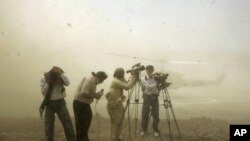Pakistan earned the dubious distinction in 2010 of becoming the deadliest place in the world to be a journalist. A study released this month by the Committee to Protect Journalists (CPJ) shows that eight of the 42 journalists killed in the line of duty worldwide were killed in Pakistan. Iraq, Mexico and Honduras followed behind Pakistan, where militants have stepped up suicide attacks on military and civilian targets as the U.S.-led war on terror rages on.
Nafees Takar is the chief of VOA's Pashto-language Deewa service, which broadcasts to the volatile border regions of Pakistan and Afghanistan. He tells VOA's Barry Newhouse about the dangers journalists face there.
What is it about the media environment in Pakistan that has made the job so dangerous there? Aren't the editors and reporters aware of the inherent risks of the job?
"Most of the time, when one media outlet in Pakistan uses a report, for example, on [U.S. missile] drone attacks, another media outlet will also be forcing the reporting in the region and will be expecting from their reporter a story which might be better than other one, with the soundbites of the people, and maybe the outlet will also be expecting that he or she should get some pictures of the area which has been hit by the missle attack. And that makes trouble for them in the sense that nobody can go to those areas. And if a journalist tries to go there, they are sure for inviting trouble for themselves."
And who are these journalists who are operating in these regions? Are they from other parts of the country? Or are they locals who are hired from that area?
"These are local journalists. No one from outside the tribal districts of Pakistan, no journalists from other areas are coming for themselves to go to Swat Valley or to Waziristan or to Kurram tribal region. Most of these guys are local people. These are very dangerous areas. Language is also a barricade. If someone comes from Karachi or Lahore, his first problem is language and he can be easily identified by locals as well as by the militants groups, and also by the security agencies. So for someone outside the local zone, it's difficult for them to do journalism in those trouble zones. But, mostly, the victims are the local journalists."
For these people who undertake this work in these dangerous places, what motivates them to go out and do this everyday?
"You know, when they work for a foreign news agency, they are good paymasters. Maybe they have also their mission, journalistic mission to expose their region, to expose the regional politics to the rest of Pakistan and the rest of the world. That also may be one reason, but money is also one attraction. If you are working in a tribal area for a news agency which is a foreign news agency, I think they would love to work for them. As far as the local media is concerned, I think these journalists who are based in the tribal zones, they are no more working for the newspapers. They are mostly working for the television channels, the private television channels, and that also has its own attraction. These are young guys. They want to go on adventures, but at the same time, they don't know how to manipulate and how to go ahead with the story and, in the end, they sometimes get into trouble."
With all these dangers and risks in journalism in Pakistan, are you seeing that journalists are being intimidated and are not going into the profession? Or, are there more people interested in this profession now than five years ago?
"It depends. I have seen journalists who were covering war on terror, but after two or three years, they have stopped. And they moved to urban centers, where they are involved in political issues. And there are guys who continue, who like to cover the war on terror and some of them died. And every year we have seen that journalists in Pakistan have received threats, they are either gunned down or some of them even are forced to resign the media organization. It depends. But journalism is still considered the sister or brother of the show business industry and youngsters like it. Television is a big screen in Pakistan. It's charm is too much and I think television is attracting many youngters towards itself."









